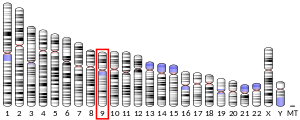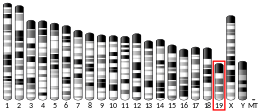PIP5K1B
PIP5K1B
Protein-coding gene in the species Homo sapiens
Phosphatidylinositol-4-phosphate 5-kinase type-1 beta is an enzyme that in humans is encoded by the PIP5K1B gene.[5][6][7]
Quick Facts Identifiers, Aliases ...
Close
Abnormal silencing of the PIP5K1B gene contributes to the cytoskeletal defects seen in Friedreich's ataxia.[8]
- "Human PubMed Reference:". National Center for Biotechnology Information, U.S. National Library of Medicine.
- "Mouse PubMed Reference:". National Center for Biotechnology Information, U.S. National Library of Medicine.
- Pook MA, Carvajal JJ, Doudney K, Hillermann R, Chamberlain S (Jul 1997). "Exon-intron structure of a 2.7-kb transcript of the STM7 gene with phosphatidylinositol-4-phosphate 5-kinase activity". Genomics. 42 (1): 170–2. doi:10.1006/geno.1997.4726. PMID 9177790.
- Bayot A, Reichman S, Lebon S, Csaba Z, Aubry L, Sterkers G, Husson I, Rak M, Rustin P (2013). "Cis-silencing of PIP5K1B evidenced in Friedreich's ataxia patient cells results in cytoskeleton anomalies". Hum. Mol. Genet. 22 (14): 2894–904. doi:10.1093/hmg/ddt144. PMID 23552101.
- Niiro H, Clark EA (2003). "Branches of the B cell antigen receptor pathway are directed by protein conduits Bam32 and Carma1". Immunity. 19 (5): 637–40. doi:10.1016/S1074-7613(03)00303-0. PMID 14614850.
- Carpenter CL (2004). "Btk-dependent regulation of phosphoinositide synthesis". Biochem. Soc. Trans. 32 (Pt 2): 326–9. doi:10.1042/BST0320326. PMID 15046600.
- Carvajal JJ, Pook MA, Doudney K, et al. (1995). "Friedreich's ataxia: a defect in signal transduction?". Hum. Mol. Genet. 4 (8): 1411–9. doi:10.1093/hmg/4.8.1411. PMID 7581382.
- Loijens JC, Anderson RA (1997). "Type I phosphatidylinositol-4-phosphate 5-kinases are distinct members of this novel lipid kinase family". J. Biol. Chem. 271 (51): 32937–43. doi:10.1074/jbc.271.51.32937. PMID 8955136.
- Chang JD, Field SJ, Rameh LE, et al. (2004). "Identification and characterization of a phosphoinositide phosphate kinase homolog". J. Biol. Chem. 279 (12): 11672–9. doi:10.1074/jbc.M309721200. PMID 14701839.
- Humphray SJ, Oliver K, Hunt AR, et al. (2004). "DNA sequence and analysis of human chromosome 9". Nature. 429 (6990): 369–74. Bibcode:2004Natur.429..369H. doi:10.1038/nature02465. PMC 2734081. PMID 15164053.
This article on a gene on human chromosome 9 is a stub. You can help Wikipedia by expanding it. |




